The second quarter in FY23 in SARTTAC (August – October 2022) was highlighted by a visit to the Center by IMF Managing Director Kristalina Georgieva. The Managing Director was in India on her first official visit to the country in her current role, mainly to meet with leaders and officials ahead of India assuming the G-20 Presidency for 2023. During her three days in Delhi, she had the opportunity to meet with Prime Minister Narendra Modi, Finance Minister Nirmala Sitharaman, and other senior officials and thought leaders. In her meeting with the Finance Minister, she thanked India for its invaluable contribution to SARTTAC, encouraging the government to remain in a foundational role in terms of its guidance and support of Phase II of the Center’s operations, which is expected to commence in 2023.
IMF Managing Director Kristalina Georgieva’s visit to SARTTAC (September 9, 2022).
The Managing Director also took time out of her busy schedule to visit SARTTAC, the first time for an IMF managing director. The visit gave staff an opportunity to showcase the Center’s work and discuss ways to contribute more to the IMF’s engagement in South Asia while receiving the needed support from headquarters. In turn, the Managing Director, in a meeting with staff in SARTTAC and from the IMF Resident Representative Office for India, emphasized the importance of the Fund's work in capacity development (CD), especially in assisting member countries (MCs) in meeting post-pandemic challenges and those brought on by geopolitical tensions. She also shared her views on some of the transformational areas of IMF work, including their impact on CD, notably around digitalization, urging staff to leverage India’s leadership in this area to help improve the efficacy of tax and expenditure policies, payment systems, and statistical analysis in other MCs.
During the visit, the Managing Director had an opportunity to see training in action, joining a course on Macroprudential Stress Testing led by the IMF Monetary and Capital Markets Department (MCM) for officials from Bangladesh Bank and the Bangladesh Ministry of Finance. In a course session on climate-related risks and stress testing, the Managing Director had an engaging interaction with participants, sharing views on the IMF’s role on climate issues and the significance of the course for Bangladesh’s own strategy in managing climate change. Jayendu De, IMF Resident Representative for Bangladesh, joined the session from remote, noting the importance of the training and concurrent MCM technical assistance (TA) for Bangladesh on stress testing and strong coordination between his office, SARTTAC, and MCM to ensure impactful support to strengthening the financial sector.
IMF Managing Director Kristalina Georgieva addressing a course on Macroprudential Stress Testing at SARTTAC, with Pierpaolo Grippa and Wei Sun (both MCM) (September 5-9, 2022).
Joining the Managing Director in SARTTAC was Krishna Srinivasan, who had been appointed recently as the Director of the IMF Asia and Pacific Department (APD). Krishna’s visit was the first of two to India and SARTTAC in FY23 Q2, with the second occurring in late October when he led a team from APD to New Delhi to present the IMF Regional Economic Outlook for the Asia-Pacific region. During that visit, at SARTTAC’s invitation, Krishna and Shanaka (Jay) Peiris and Davide Furceri from APD’s Regional Studies Division delivered a lecture on regional economic prospects to officials from the Indian Economic Service receiving mid-career macroeconomics training.
Climate Change Indicators
SARTTAC assisted the IMF Statistics Department (STA) in organizing a virtual workshop titled Introduction to Climate Change Indicators (CCIs) for Economic Analysis and Policy Formulation (October 31-November 3) for officials from the SARTTAC member countries, along with those from Cambodia, Lao P.D.R., Philippines, and Vietnam. The workshop raised awareness of CCIs used by the IMF for surveillance and included in Fund's Climate Change Indicator Dashboard. This was the first workshop of its kind offered by SARTTAC and STA, with some 50 officials joining more than a dozen presenters as well as a high-level panel from the UN Food and Agriculture Organization, UN Statistics Division, and UN Economic and Social Commission for Asia and the Pacific. The panel was moderated by Mr. James Tebrake, Deputy Director, STA, who also opened the workshop.
Regional course (virtual) on Introduction to Climate Change Indicators for Economic Analysis and Policy Formulation (October 31-November 3, 2022).
Climate change is a major threat to long-term growth and prosperity and impacts the economic well-being of all countries directly. Therefore, policymakers will need to compile a range of environmental and climate related statistics to support the development of fiscal and macroeconomic policies to address the economic implications of climate change. This workshop provided participants with an overview of indicators that can fulfill this role and introduced the statistical framework needed to produce them. For example, consumption-based emission estimates can gauge the emission trail of different goods and services consumed in an economy, which can be used to better assess carbon reduction options suited for climate goals. Linkages between these indicators and the critical climate change concerns of SARTTAC member countries were also identified.
While some countries in the region have developed frameworks to collect, analyze, and disseminate environmental data, changes will have to be made to their statistical classification systems to better capture a range of environmental goods and services. In addition, mechanisms will have to be put in place for the regular production of macro-relevant indicators based on the System of Environmental Economic Accounting. SARTTAC stands ready to support countries in their efforts for producing CCIs.
SARTTAC and CDOT continued their collaboration in FY23 Q2 in training on common challenges facing countries under their respective capacity development (CD) programs, including on climate issues. A joint workshop was organized on Taking on Green PFM and Climate Change at SARTTAC (October 17-20), also in collaboration with United Nations Development Programme (UNDP) office in Bangkok. It covered green public financial management (PFM) concepts and practices based on IMF Staff Climate Notes, the forthcoming How to Note on the Green PFM, and the C-PIMA (Climate-Public Investment Management Assessment) framework. Presentations focused on challenges to implementing green PFM and drew attention to regional good practices.
Nine countries joined the workshop—all six member countries (MCs) in SARTTAC as well as Cambodia, Lao P.D.R., Philippines, and Vietnam, with most noting challenges in increasing green expenditure. The workshop’s consensus was that climate tagging of budget—i.e., monitoring and tracking of climate-related spending in the national budget system—occurs for limited categories of expenditures and should be expanded; climate change commitments are generally noted in budget documents, but information on all aspects of climate change activity and details on funding need to be identified; and investment project appraisal and selection can be made more climate sensitive. Each might be a future area for technical assistance (TA) as more IMF CD is mainstreamed in these areas.

Regional course on Taking on Green PFM and Climate Change delivered in New Delhi (October 17-20, 2022).
Earlier, SARTTAC and CDOT held a joint workshop on Digitalization of PFM: The Changing Topography (September 5-9), conducted in-person in Siem Reap, Cambodia in collaboration with Cambodia’s Ministry of Economy and Finance (MEF). Opening remarks were delivered by H.E. Vongsey Vissoth, Permanent Secretary of State, MEF, while a keynote address was made on India’s experience with digitalization by Mr. Rajat K. Mishra, Additional Secretary, Ministry of Finance (India), who is also the ministry’s representative on SARTTAC’s Steering Committee. Building on a September 2021 virtual workshop on a similar topic, this workshop disseminated good practices on digitalization in PFM, focusing on key prerequisites and enablers and provided opportunity to participants from more the 10 countries, including all six under SARTTAC, for peer-to-peer learning on ongoing and planned digitalization initiatives.

Regional workshop on Digitalization of PFM: The Changing Topography in Siem Reap, Cambodia (September 5-9, 2022). Mr. Rajat K. Mishra delivering the keynote address (right).
Finally, SARTTAC and CDOT are providing a series of joint workshops on different topics around monetary policy implementation. Since FY22, six virtual short courses (three to four half-days) have been held, led jointly by regional monetary and foreign exchange (FX) operations advisors in SARTTAC and CDOT and joined by resource persons from the IMF Monetary and Capital Markets Department, as well as selected central banks—both from inside and outside South and Southeast Asia. SARTTAC MC central banks have also made presentations on different topics as part of experience sharing.
SARTTAC - CDOT course (virtual) on Monetary Policy Implementation: Reference Exchange Rate (October 18-20, 2022).
The format is proving popular because each workshop focuses on a single topic, which is also tied to TA in some countries, and requires a limited time commitment by participating officials. So far, short courses have been done on the interest rate corridor (August 2021), daily liquidity management (October 2021), collateral framework (for central bank liquidity-providing operations) (January 2022), emergency liquidity assistance/lender of last resort (April 2022), reserve requirements (July 2022), and the reference exchange rate (October 2022), with a seventh course on FX operations scheduled for January 10-12, 2023. For more on the remainder of SARTTAC’s training schedule in FY23, see https://www.sarttac.org/content/sarttac/en1/trainingschedule2023.html.
During September 20-22, David Cowen, Director of SARTTAC, visited Bangladesh to discuss with officials the effectiveness of SARTTAC’s support and near- to medium-term CD needs, in part in preparations for Phase II. For David, the visit to Bangladesh was also a reunion of sorts, as he had served previously as IMF mission chief on Bangladesh for the APD during 2010-13, at which time he led program engagement between Bangladesh and the Fund, culminating in a three-year Extended Credit Facility (ECF) arrangement starting in 2012.

Bangladesh Bank Governor Mr. Abdur Rouf Talukder (center) hosting meeting with David Cowen and Jayendu De, joined by Deputy Governor Mr. Kazi Sayedur Rahman (far left) and Mr. Md Julhas Uddin, Executive Director (Research) and Alternate Representative for Bangladesh on SARTTAC’s Steering Committee (far right) (September 22, 2022).
Much has changed in Bangladesh over the past decade as one of the world’s fastest growing economies, but the authorities remain resolute in their use of IMF capacity development resources to strengthen institutions and frameworks key to sound macroeconomic management. The visit, which was arranged and joined by Jayendu De, IMF Resident Representative for Bangladesh, provided an opportunity to hear how SARTTAC could better support Bangladesh Bank (BB), the Ministry of Finance (including its Institute of Public Finance (IPF)), and the Bangladesh Bureau of Statistics—all core to the Center’s active engagement there, including through customized training for the IPF.
Highlights of the visit included meetings with BB Governor Mr. Abdur Rouf Talukder; Finance Secretary Ms. Fatima Yasmin; and Head of the Ministry of Planning’s Statistics and Informatics Division overseeing BBS, Secretary Dr. Shahnaz Arefin. Each shared their views on IMF CD and how areas for future support by SARTTAC could build on progress in Phase I on strengthening the monetary policy framework, financial sector supervision, treasury and debt management, and macroeconomic statistics, including national accounts and prices and government finance statistics (GFS).
During the visit, an ongoing GFS mission in Bangladesh led by Andrew Evans, GFS Advisor in SARTTAC, combined TA and topical training to around 20 officials and provided an opportunity to observe SARTTAC resources in action. David and Jayendu also took time to meet with H.E. Charles Whiteley, Ambassador and Head of Delegation of the European Union to Bangladesh to brief him and several colleagues on SARTTAC activities in Bangladesh, notably around joint interest on strengthening PFM, with the EU’s support to the Center in this area vital to CD provided in Bangladesh and elsewhere in South Asia.

Participants in a Goverment Finance Statistics mission to Bangladesh (September 18-22, 2022).
Engagement on CD by SARTTAC and others in the IMF with Bangladesh is expected to intensify through the FY23 and into next year, in part with BB starting a new project on developing a Forecasting and Policy Analysis System to improve monetary policy decision making and given a staff-level agreement reached in October 2022 on an Extended Credit Facility (ECF)/Extended Fund Facility (EFF)/Resilience and Sustainability Facility (RSF) arrangement.
Staff Announcements
 |
Jacques Loubert, SARTTAC’s financial sector supervision and regulation advisor, completed a five-year assignment in mid-August 2022, serving as the Center’s first advisor in this capacity. During his tenure, Jacques led SARTTAC’s engagement with member countries on financial sector issues, with a focus on strengthening banking and insurance supervision, drawing on his many years of experience. A replacement for Jacques is expected to join SARTTAC in the first quarter of 2023.
|
 |
Stefaan Ide, SARTTAC’s monetary and foreign exchange operations advisor, departed at end-September 2022, following a nearly four-year assignment. He took up a similar position in the IMF Middle East Technical Assistance Center (METAC) in Beirut, Lebanon. Stefaan’s tenure in SARTTAC culminated with an innovative course on central bank operations in a world of digital money, which he designed with the IMF Monetary and Capital Markets Department. A new advisor is expected to take up the post in early 2023.
|
Technical Assistance: August – October 2022
BANGLADESH
Macroeconomics: A mission (August 3-11) assessed Bangladesh Bank’s (BB) existing Forecasting and Policy Analysis System (FPAS) capacity in terms of decision-making structure, tools and processes, internal and external communications. The mission also devised a medium-term workplan for modernizing BB’s analytical, forecasting, and monitoring capacity through the development of a model-based FPAS.
Real Sector Statistics: A mission (August 21-September 1) supported the Bangladesh Bureau of Statistics (BBS) with finalizing an updated consumer price index (CPI) for dissemination. The mission also helped the authorities in preparing a document describing improvements implemented with the new CPI and provided training to BBS staff on the new CPI compilation methods.
Government Finance Statistics: In response to a request from the Ministry of Finance, a mission (September 18-22) reviewed progress made against the authorities’ plans to produce quarterly government finance statistics (GFS) for the budgetary central government (BCG) as well as expenditure data by functional categories for BCG in accordance with the Classification of the Functions of Government framework. The mission focused on compiling preliminary GFS data for financial year 2021/22. In addition, an ‘Introduction to GFS’ training course was delivered to officials.
Monetary and Foreign Exchange Market Operations: SARTTAC, through a mission (August 23-29), supported BB’s monetary policy implementation framework modernization plan of transitioning from a reserve money target regime to an interest-rate target regime. In addition to designing the roadmap to further support the transition, the mission also provided examples of successful introduction of an interest-rate focused monetary policy framework in peer countries.
BHUTAN
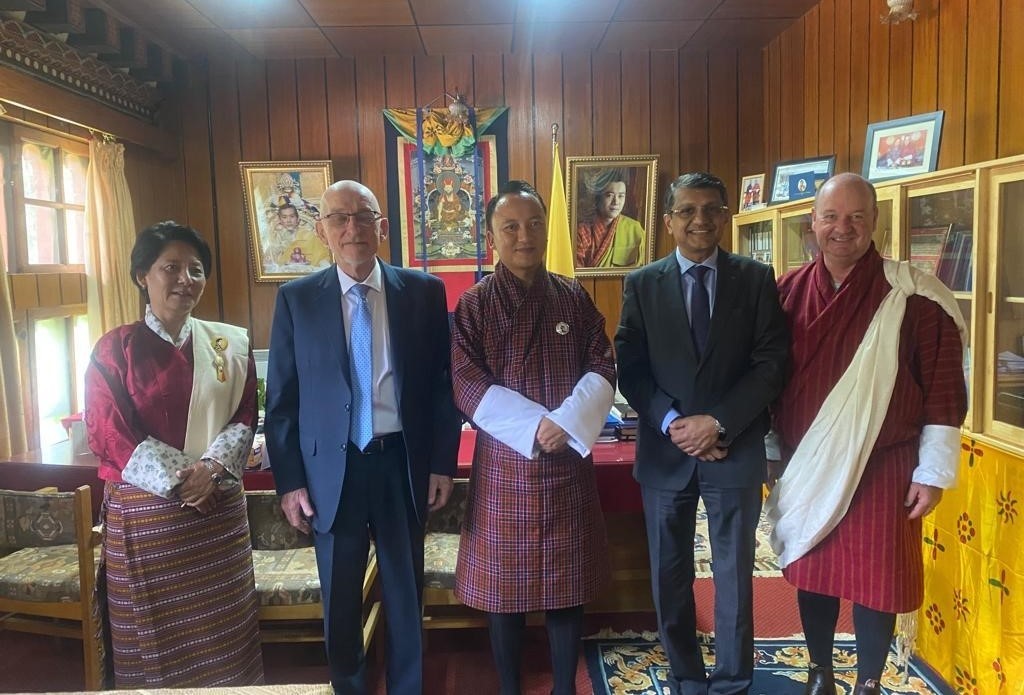
Revenue Administration: In September 2022, SARTTAC revenue administration advisor participated in an exit meeting of the Tax Administration Diagnostic Assessment Tool (TADAT) mission with the Ministry of Finance’s Department of Revenue and Customs (DRC). The TADAT, which was led by the Asian Development Bank (ADB), highlighted the strengths and weaknesses of Bhutan’s tax system in various areas in terms of the TADAT scoring methodology. Another mission (October 10-21) facilitated a series of workshops for DRC management to review the TADAT assessment findings and evaluate options to support immediate increases in revenue collection through short-term administrative improvements that fall under the authority of the DRC, and medium-term actions requiring policy, legal, and structural changes.
Government Finance Statistics: A virtual mission (October 24-28) followed up on work done during a previous mission in early 2022. It focused on the compilation of provisional GFS for the latest financial year 2021/22 based on annual financial statements for BCG. During the mission, key aggregates, balancing items, and components were compiled for GFS transactions.
Real Sector Statistics: Two missions were delivered to the National Statistics Bureau (NSB) during the quarter—both virtual. The first mission (August 8-19) focused on compiling quarterly Gross Domestic Product (QGDP). It provided hands-on training on (i) assessing available high frequency indicators (HFIs) based on their statistical properties; and (ii) using these HFIs to compile experimental estimates of QGDP. A QGDP compilation template was also developed for selected economic activities and experimental quarterly value-added estimates were compiled. The purpose of the second mission (October 17-21) was to assist the NSB with developing supply-and-use tables (SUTs) for the 2017 benchmark year. The SUT will be a major input in rebasing national accounts from 2000 to 2017. The mission built on the progress made during previous missions on updating the product dimension of the SUT and reviewed preliminary estimates of production-based value added for certain industries and verified the differences from previously published estimates.
INDIA
Public Financial Management: A mission (August 22-24) met with officials from the state of Assam’s Finance Department (FD) to evaluate potential parameters (activities and milestones) for a proposed capacity development engagement in public financial management (PFM) and macro-fiscal frameworks. The visit built on prior discussions with the FD on the design of a workplan. Another mission (September 5-9) with the state of Odisha built on its PFM reforms, reviewing the existing budget-related publications through a series of meetings and workshops. The first workshop focused on the principles of sound budget documentation. Subsequent workshops focused on reviewing and improving two key budget documents—the Citizens budget (known as the “People’s Budget”) and the budget overview document (i.e., “Odisha Budget: An Insight”).
Real Sector Statistics: A mission (September 12-16) assisted the National Statistics Office of the Ministry of Statistics and Programme Implementation in developing procedures to derive Gross Domestic Product (GDP) at constant prices using the double deflation method. The procedure will contribute to the upcoming base year update for GDP estimates.
MALDIVES
Macroeconomics: A mission (August 14-18) worked with a technical team led by the Maldives Monetary Authority in customizing and implementing a macro-framework in line with the “Comprehensive Adaptive Expectations Model”. The mission focused on two areas: (i) customizing the template to the Maldivian economy and simplifying the framework where appropriate; and ii) formulating a baseline forecast and running policy scenarios.
Revenue Administration: A mission (August 7-15) assisted the authorities with the development of a Medium-Term Revenue Strategy (MTRS) covering 2023-28. Discussions held with Maldives Internal Revenue Authority and its Customs Service identified key themes to contribute to the revenue generation goals for the planned MTRS. The mission was conducted jointly with experts from SARTTAC and the IMF Fiscal Affairs Department (FAD), in collaboration with a representative from the ADB.
Public Financial Management: A mission (August 28-September 2) to help Maldives Ministry of Finance (MoF) improve their budget documentation was delivered. It reviewed available documentation on the MoF’s website, met with officials, and provided guidance on improving documents and narrative, consistent with the government’s objective of improving the quality of their budget reporting and communication.
NEPAL
Revenue Administration: At the request of the MoF, a mission (August 24-September 6), under the lead of FAD and with SARTTAC, provided guidance on a Revenue Mobilization Strategy (RMS). The mission focused on developing an action plan and made reform recommendations that would support government revenue increases. Boosting revenues is a key policy objective under IMF’s Extended Credit Facility (ECF) arrangement with Nepal agreed in January 2022.
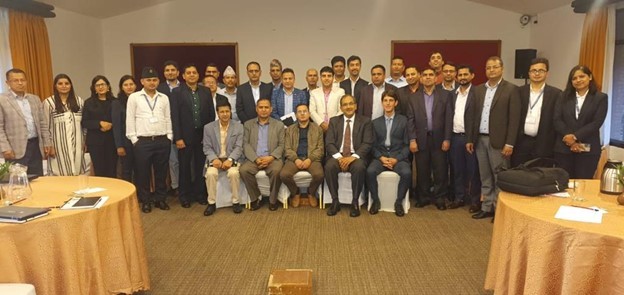
Public Financial Management: A mission (September 19-23) delivered hands-on training and TA in a workshop set up on developing a Fiscal Risk Register (FRR). It focused on identifying and analyzing fiscal risks using the FAD’s Fiscal Risk Assessment Tool (FRAT). The key output was a set of fiscal risk data collection templates developed by the authorities.
Real Sector Statistics: A mission (October 10-14) assisted the Central Bureau of Statistics in converting SUTs into Input-Output Tables (IOTs). The IOTs describe the relationship between industrial sectors within an economy and show how the output of one sector flow into another sector as input. The IOTs will be useful for checking the numerical consistency of estimates. The mission also included training sessions featuring hands-on exercises for converting SUTs into IOTs.
SRI LANKA
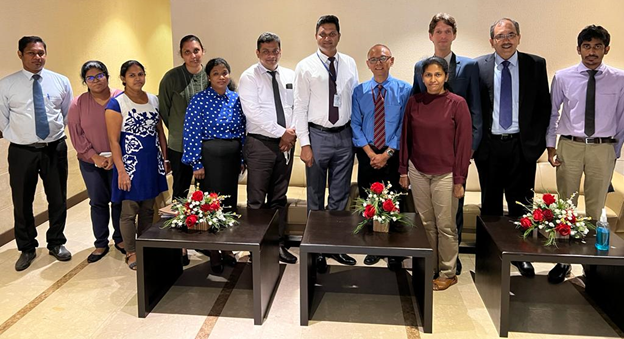
Public Financial Management: In response to a request from the MoF, a mission (October 3-7) provided training to the Macro-Fiscal Unit (MFU) on strengthening fiscal risks management. The mission worked with the MFU and relevant MoF divisions to identify key sources of fiscal risks and their current monitoring frameworks for macro-fiscal risks and risks arising from public enterprises, government guarantees and public-private partnerships (PPPs). The mission also worked with the MFU to identify the gaps that need to be addressed to strengthen fiscal risk management and establish a FRR that could be further developed into a Fiscal Risk Statement.
IMF Departments: FAD (Fiscal Affairs), MCM (Monetary and Capital Markets), STA (Statistics)
SARTTAC Funding Programs: FSR (Financial Sector Supervision and Regulation). GFS (Government Finance Statistics), MONOPS (Monetary and Foreign Exchange Operations), PFM (Public Financial Management), RA (Revenue Administration), and RSS (Real Sector Statistics)
Access SARTTAC TA Reports on secure website (Requires Login Credentials)
Macroeconomics: A course on Macro-econometric Forecasting and Analysis (September 19-30) gave government officials from the region a rigorous foundation in the estimation of macro-econometric models and their application in nowcasting, forecasting, and policy analysis in central banks, finance/planning ministries, and public research institutions. Each topic included a lecture that discussed the underlying theory and a related workshop with practical applications using EViews.
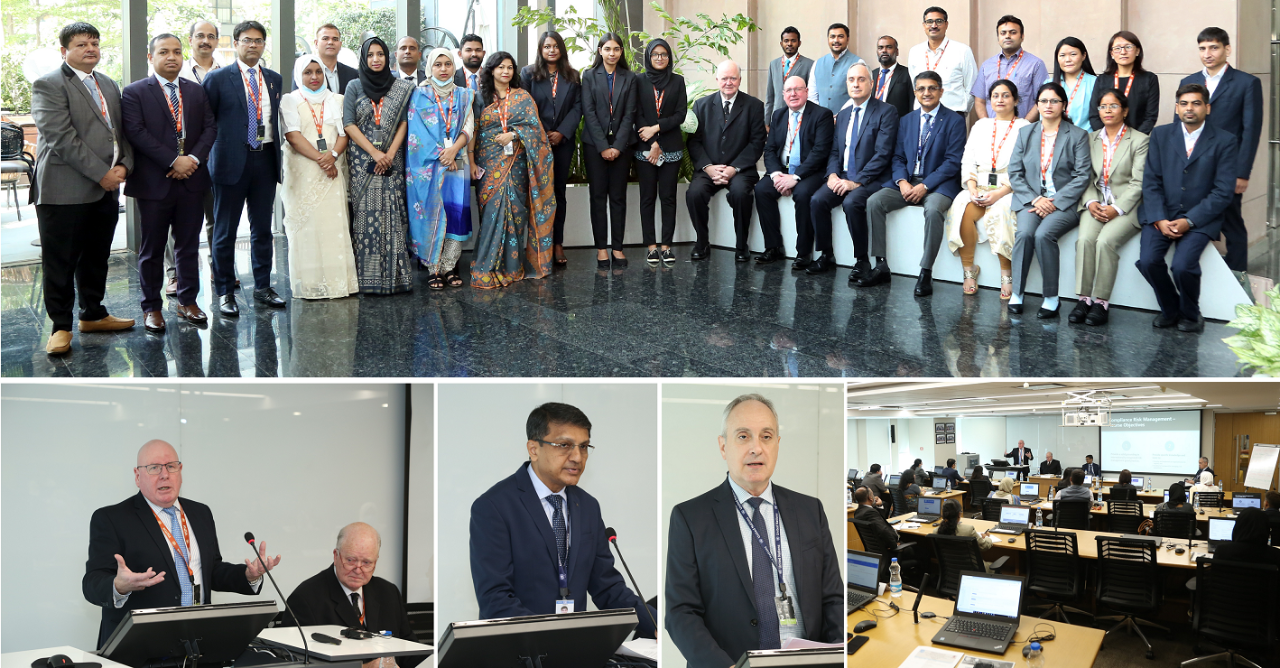
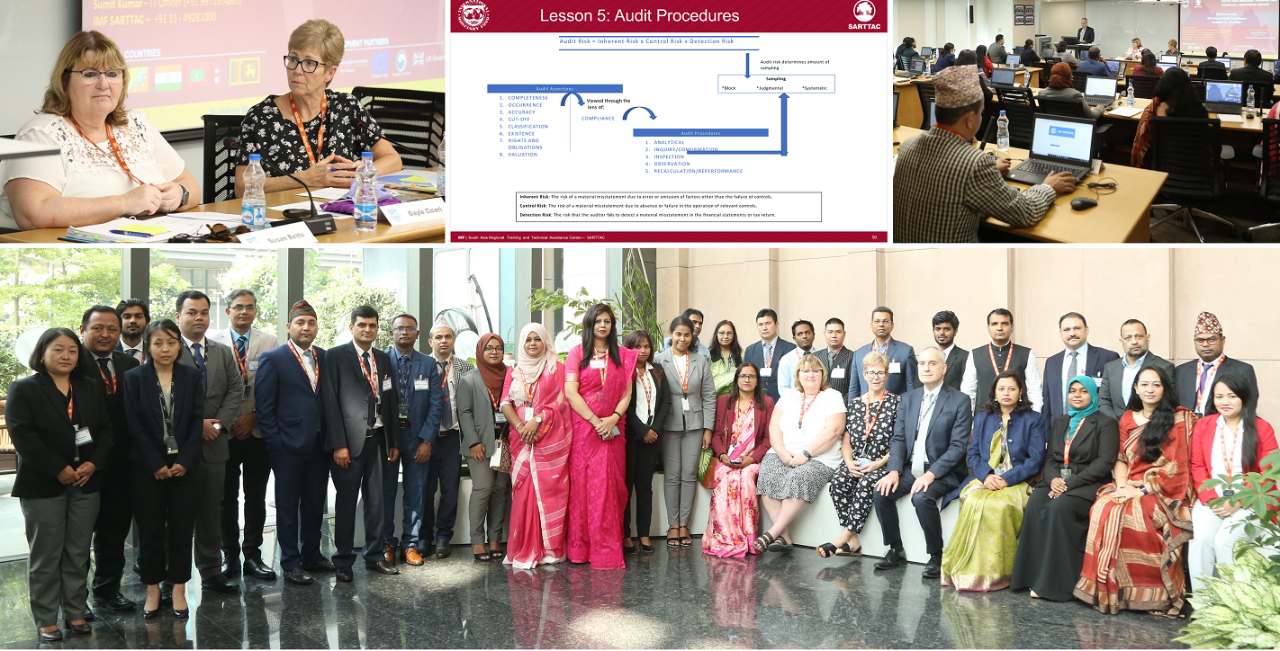
Revenue Administration: A workshop on Compliance Risk Management (CRM) (September 12-16) provided participants with an understanding of theoretical concepts behind identifying and managing compliance risks and the practical application of those concepts. The concepts of risk profiling though a risk differentiation framework and compliance improvement plans were reinforced through case studies and simulations. Group activities helped the participants consider how existing CRM approaches in their revenue authorities could be strengthened to improve tax revenue collections. Another workshop (October 17-21) during the quarter introduced participants to Risk-Based Audit Techniques and procedures, including in the planning and conduct stages of audit. Participants were encouraged to brainstorm during cross-administration discussions about the audit risks they come across, and how to best utilize the tools and techniques taught during the workshop.
Real Sector Statistics: A course (August 29-September 2) covered theoretical and practical issues related to the compilation of Sectoral Accounts (current and capital accounts, financial accounts, other changes in volume of assets accounts, and revaluation accounts) and Balance Sheets according to institutional sectors. The training will enable participants to explain to policymakers the importance and relevance of compiling sectoral accounts and balance sheets for the analysis of macroeconomic developments in the economy. Later in the quarter a virtual workshop titled Introduction to Climate Change Indicators for Economic Analysis and Policy Formulation (October 31-November 3) was organized in collaboration with STA.
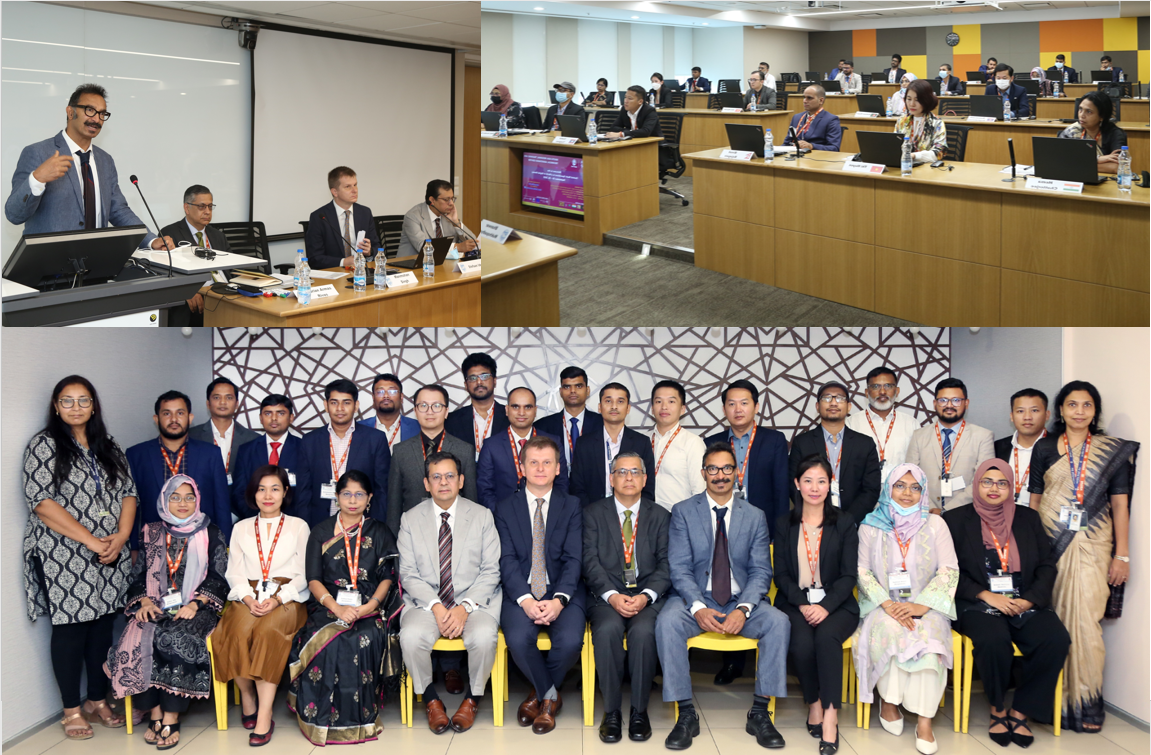
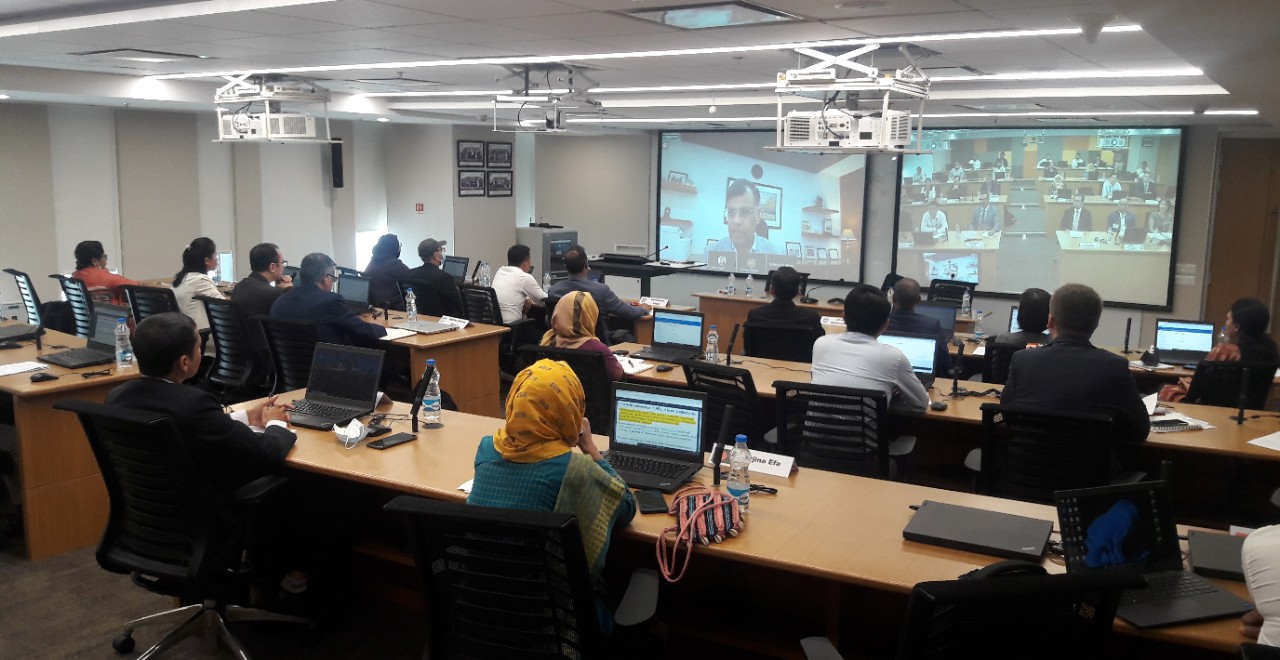
Monetary and Foreign Exchange Market Operations: A newly developed course titled Central Bank Operations in a World of Digital Money (September 26-30) was delivered to officials from central banks in the SARTTAC region and as well as from central banks in Vietnam and Lao P.D.R. The course focused on monetary policy implementation in the presence of central bank digital currencies and bank and non-bank issued stablecoins. Lectures, which were delivered by SARTTAC and the IMF Monetary and Capital Markets Department (MCM), elaborated on the redefinition of monetary aggregates to accommodate new payment assets. Reserve Bank of India (RBI) Deputy Governor Mr. T Rabi Shankar also delivered a guest lecture on RBI's experiences and challenges with digital money. Course content was steered by two recent IMF working papers: (i) Kahn, Singh & Alwazir (2022); “Digital Money and Central Bank Operations”; and (ii) Armas & Singh (2022); “Digital Money and Central Banks Balance Sheet”. In October, virtual training on the Reference Exchange Rate (RER) (October 18-20) was the sixth in a series of regional workshops on monetary policy implementation organized jointly by SARTTAC and CDOT. As with others, this one aimed at bridging the gap between the standard IMF courses on monetary policy topics and issues arising from TA missions. The training covered main principles and country experiences about the determination mechanism of the RER and its uses.
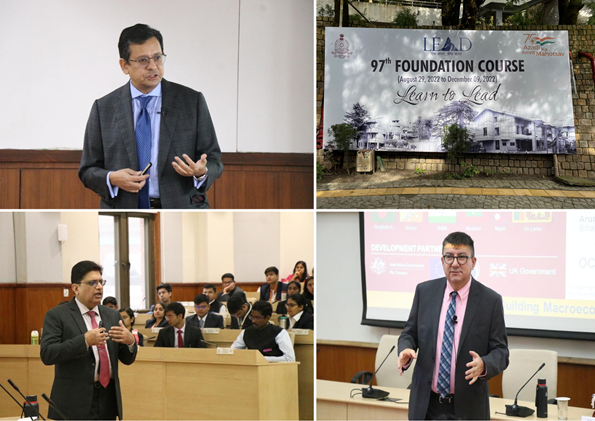
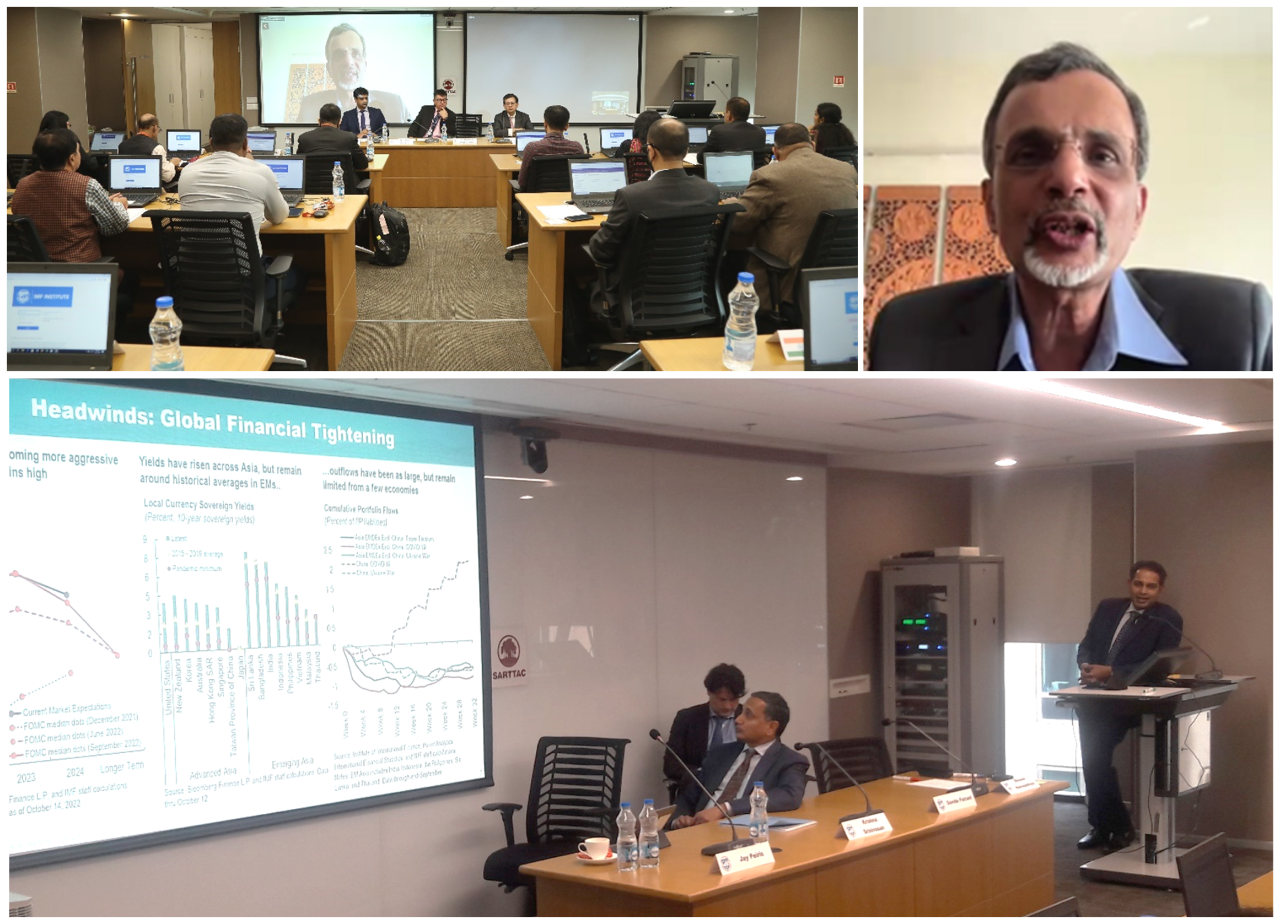
Macroeconomics: Two courses for different cohorts of Indian civil servants were delivered during the quarter. The first course (October 10-14), which was part of the foundation training for new entrants into the Indian civil services, was delivered at the Lal Bahadur Shastri National Academy of Administration (LBSNAA) in Mussoorie, Uttarakhand. The course introduced participants to key macroeconomic concepts and was designed to strengthen their ability to assess a country's macroeconomic situation, with a specific case study on India. The second course (October 31-November 11) was delivered to mid-career Indian Economic Service officers. It covered a broad range of macroeconomic issues. The course analyzed the four main macroeconomic sectors (real, fiscal, external, and monetary) and their interlinkages, including macro-fiscal and macro-financial aspects, and how to diagnose macroeconomic imbalances and financial stability risks. Trainers related the theoretical material to the Indian context and helped participants develop a deeper understanding of India's present economic opportunities and challenges. Highlights in the course included opening remarks from Dr. V. Anantha Nageswaran, Chief Economic Advisor to the Government of India, and a guest lecture on recent global and regional economic developments by Mr. Krishna Srinivasan, Director of the IMF Asia and Pacific Department (APD), who was in the region launching APD’s Regional Economic Outlook.
Revenue Administration: As part of the ongoing training project for India’s Central Board of Direct Taxes of India, a workshop on Risk Based Audit Techniques was delivered (October 10-14). Participants gained exposure to the multiple facets of audit risk and risk-based audit techniques and procedures (similar to the regional workshop on the same topic during October 17-21).
Public Financial Management: A second course in a series of three during FY23 was delivered (October 10-14) on Strengthening the Public Financial Management Framework for civil servants from Bangladesh, in collaboration with the MoF’s Institute of Public Finance’s Fiscal Economics and Economic Management course. The training focused on topics like macroeconomic and fiscal frameworks, strategic budgeting, expenditure and revenue forecasts, public investment management, and PFM and digitalization.
